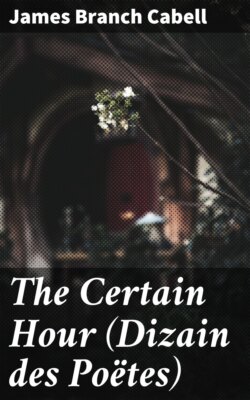Читать книгу The Certain Hour (Dizain des Poëtes) - James Branch Cabell - Страница 9
На сайте Литреса книга снята с продажи.
V
ОглавлениеTable of Contents
So much for the plea of us average-novel-readers; and our plea, we think, is rational. We are "in the market" for a specified article; and human ingenuity, co-operating with human nature, will inevitably insure the manufacture of that article as long as any general demand for it endures.
Meanwhile, it is small cause for grief that the purchaser of American novels prefers Central Park to any "wood near Athens," and is more at home in the Tenderloin than in Camelot. People whose tastes happen to be literary are entirely too prone to too much long-faced prattle about literature, which, when all is said, is never a controlling factor in anybody's life. The automobile and the telephone, the accomplishments of Mr. Edison and Mr. Burbank, and it would be permissible to add of Mr. Rockefeller, influence nowadays, in one fashion or another, every moment of every living American's existence; whereas had America produced, instead, a second Milton or a Dante, it would at most have caused a few of us to spend a few spare evenings rather differently.
Besides, we know—even we average-novel-readers—that America is in fact producing her enduring literature day by day, although, as rarely fails to be the case, those who are contemporaneous with the makers of this literature cannot with any certainty point them out. To voice a hoary truism, time alone is the test of "vitality." In our present flood of books, as in any other flood, it is the froth and scum which shows most prominently. And the possession of "vitality," here as elsewhere, postulates that its possessor must ultimately perish.
Nay, by the time these printed pages are first read as printed pages, allusion to those modern authors whom these pages cite—the pre-eminent literary personages of that hour wherein these pages were written—will inevitably have come to savor somewhat of antiquity: so that sundry references herein to the "vital" books now most in vogue will rouse much that vague shrugging recollection as wakens, say, at a mention of Dorothy Vernon or Three Weeks or Beverly of Graustark. And while at first glance it might seem expedient—in revising the last proof-sheets of these pages—somewhat to "freshen them up" by substituting, for the books herein referred to, the "vital" and more widely talked-of novels of the summer of 1916, the task would be but wasted labor; since even these fascinating chronicles, one comprehends forlornly, must needs be equally obsolete by the time these proof-sheets have been made into a volume. With malice aforethought, therefore, the books and authors named herein stay those which all of three years back our reviewers and advertising pages, with perfect gravity, acclaimed as of enduring importance. For the quaintness of that opinion, nowadays, may profitably round the moral that there is really nothing whereto one may fittingly compare a successful contribution to "vital" reading-matter, as touches evanescence.
And this is as it should be. Tout passe.—L'art robust seul a l'éternité, precisely as Gautier points out, with bracing common-sense; and it is excellent thus to comprehend that to-day, as always, only through exercise of the auctorial virtues of distinction and clarity, of beauty and symmetry, of tenderness and truth and urbanity, may a man in reason attempt to insure his books against oblivion's voracity.
Yet the desire to write perfectly of beautiful happenings is, as the saying runs, old as the hills—and as immortal. Questionless, there was many a serviceable brick wasted in Nineveh because finicky persons must needs be deleting here and there a phrase in favor of its cuneatic synonym; and it is not improbable that when the outworn sun expires in clinkers its final ray will gild such zealots tinkering with their "style." This, then, is the conclusion of the whole matter. Some few there must be in every age and every land of whom life claims nothing very insistently save that they write perfectly of beautiful happenings. And even we average-novel-readers know it is such folk who are to-day making in America that portion of our literature which may hope for permanency.
Dumbarton Grange
1914–1916
